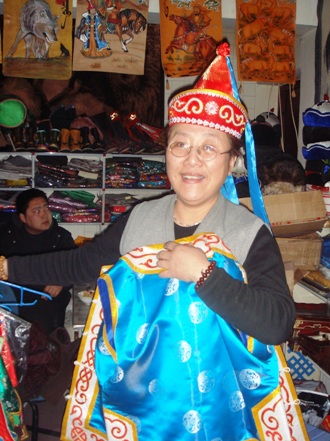Click here to listen to Xinna's Statements!
 |
|
| Xinna at her souvenir store. |
The following is an English summary of a statement by Xinna, wife of prominent ethnic Mongolian political prisoner Hada and a signer of Charter 08. The original statement in Chinese was read to SMHRIC by herself, and is available here: http://free-hada-now.org/blog/?m=200901
Xinna's Statement on Charter 08:
On December 10, 2008, I had a chance to view the "Charter 08" on the internet. December 10th is very special to me because my husband was arrested on this day. December 10, 2008 is the 13th December 10th since my husband's arrest. To me, seeing the "Charter 08" on this day is highly significant. In my view, "Charter 08" was very well written, particularly the first two parts which took a good look back through history. The reason why this charter appeared at this moment is not a coincidence. It was historically inevitable. Many compare it to the Charter 77 of Czechoslovakia and the Gongche Shangshu Movement of the late Qing. It is a call from the general public.
During the past 30 years, with economic liberalization, numerous problems have failed to find resolution in China because the CCP has refused to implement political reform. As the wife of a political prisoner in China, I am very concerned about China's political situation. If Charter 08 can be implemented in China, at least my husband's case could be handled in a just manner. Article 19 of the Charter states: Truth in Reconciliation. We should restore the reputations of all people, including their family members, who were stigmatized during the political campaigns of the past or who have been labeled as criminals because of their thoughts, speech, or faith. The state should pay reparations to these people. All political prisoners and prisoners of conscience must be released. I hope the Charter will be implemented in China as soon as possible.
However, unfortunately, the Chinese Government has arrested those who proposed this document including Liu Xiabo and and has not shown any signs of releasing all of them. Regardless of this difficult situation, reportedly more than 5,000 people signed their names to support the Charter. Mongols who visit my store also expressed their interest in signing their names even though they are not sure where to find the petition drive and how to sign their names. It is up to the rulers as to how to respond to this demand from the general public.
In Southern (Inner) Mongolia, for example, Mongols are afraid to express their opinions and demands. Their rights have been violated but they lack a channel to express their concerns about serious problems. For example, Mongolian herders from the place where I used to live are outraged by the authorities' "total ban over livestock grazing" policy which in this case is just a pretext to open up mines on the grazing lands of the herders. These herders are afraid to express their discontents and afraid to respond to the situation because of the real possibility of arrest. When I asked them to ask for help from the international community by revealing the situation to the people around the world, they said they are afraid to do so.
In China, people desperately need knowledge and education on how to protect their legal rights. Some of them know a little about their rights, but most know nothing. Even if they have some knowledge about their rights, they don't know how to exercise those rights because the Government has not informed or encouraged its citizens to protect their legal rights. Let me tell you another example, recently the Inner Mongolia Normal University removed all advertisements and public notices in the Mongolian language from campus. Chinese becomes the only language allowed in written notices and advertisements on the campus of this university where the percentage of Mongolian students is higher than that in any other university of Southern Mongolia. (Even given this fact, the total number of Mongolian students here is still much smaller than the number of Han students). Outraged by the authorities' ruling, a Mongolian student from the Department of Arts of this university asked for the explanation from the school authorities who failed to provide a reasonable explanation. For having confronted the authorities, the musical concert proposed by the student was cancelled. This is what the situation is in Southern Mongolia.
Our legal rights are arbitrarily suspended and not only have the authorities refused to listen to the legitimate demands of the people, but they have also prosecuted those who try to protect their legal rights. Thus, people are afraid to speak up. This is the situation of China. However, recently there was a Mongolian language speech competition hosted by the CCP controlled Inner Mongolia TV. Many speakers expressed their concerns on various problems the Mongols are facing including the elimination of Mongolian schools, destruction of natural environment and poverty of Mongolian herders. All these are voices and outcries from the Mongols. These voices are now heard on the CCP controlled TV, which means Mongols no longer can tolerate the situation. It is also encouraging that Mongolian journalists have felt the responsibility to publicize the plight of the Mongols. Speakers from all parts of Southern Mongolia discussed in detail the situation, for instance, how many Mongolian schools have been eliminated and how the Mongol way of life has been altered etc. This points to the fact that the most basic rights and fundamental freedoms of the Mongols are not protected in China. In this regard, Charter 08 should not only serve to promote the rights of the Han majority, but also to protect the rights of the minorities.







